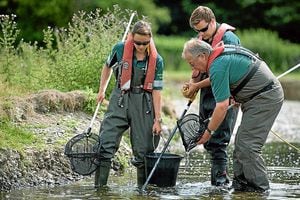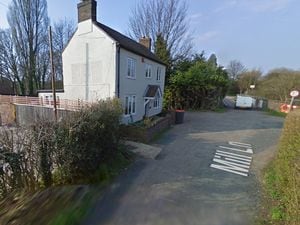Hot spell blamed as thousands of fish die
The recent heatwave has led to tens of thousands of fish dying in rivers and lakes with officials racing to rescue many more.

The hot weather and low rainfall in July led to low oxygen levels in water, leaving fish at risk of suffocation or distress, the Environment Agency said.
And heavy rainfall, such as the downpours which followed the heatwave, can cause an increase in pollution and sediment washed off roads, from sewerage systems and from agricultural land, which also lowers oxygen levels.
Rapid changes in water conditions leave little time for fish to acclimatise, the agency said.
There were more than 15 incidents in July that led to almost 50,000 fish deaths while many thousands more were rescued.
Three weeks ago agency officers were called to the River Teme at Leintwardine, near Ludlow, after fish became stranded on gravel beds.
Fish were also left stranded in isolated pools where they were at risk of suffocating due to lack of oxygen.
Officers returned to another site on the river following a warm spell last week, but said the issues had now been resolved.
Two years ago salmon and sea trout were rescued from the River Teme after it emerged they were struggling to negotiate a weir at Dinham in Ludlow as they travelled upstream.
Dave Throup, from the agency, said: "Although our last fish rescue was in 2011, we're finding that, on average, it's happening one in every three years."
In Welney, Norfolk, routine monitoring revealed a significant drop in oxygen levels in the river, and the agency installed water-aerating equipment to improve conditions for the fish.
At Pitville Park Lake in Cheltenham, teams worked round the clock and used pumping equipment to restore oxygen levels.
And in Tiptree village pond, Essex, the agency staff responded to reports of hundreds of fish in distress and 50 dead. They found oxygen levels down to three per cent. With aeration pumps they were able to boost levels to a healthy 40 per cent.
Geoff Bateman, head of fisheries and biodiversity at the agency, said: "Long periods of hot weather with low rainfall can be deadly for fish.
"The Environment Agency has a 24-hour incident hotline on 0800 80 70 60 and we encourage anglers and people out enjoying rivers, canals and lakes to call if they see fish gasping for air.
"With the help of the public we can continue to react quickly and help protect wildlife. People at home can also play their part by using water wisely. The less people take from the tap means more for our rivers and the wildlife which they support."





